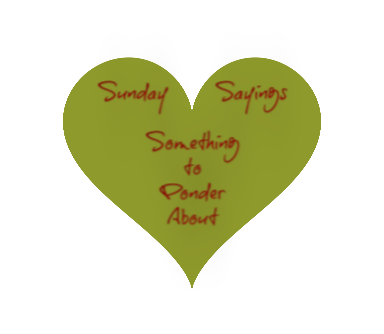
Weekly Proverb
“Worry often gives a small thing a big shadow”
~Swedish Proverb

Weekly Quotes
Worry does not empty tomorrow of its sorrow. It empties today of its strength.
~Corrie Ten Boom

How something ends up never depends on how much you worry about it
~ Unknown
Worrying can become a habitual way of responding to triggers.
- Some of us feel safer if we worry about something.
- Others feel worrying is a way of caring about someone dear.
- We might think we get better at solving problems or become motivated by worry.
- Worrying helps us to feel prepared for potential outcomes.
None of these are very accurate! Worrying does not prepare us for anything.

What do you make of this week’s sayings.
Are you a worrier?
How do you overcome worry?
Do you think worry have a beneficial use in our lives?
Everyone’s opinion is valid.
What is yours?
I invite you to leave a comment or share your views on Sunday Sayings.

Words of Wisdom
Several years ago, I created ‘Proverbial Friday’ on my blog.
I became fascinated with traditional proverbs, quotes and sayings, their metaphorical layers and the many different interpretations found within just a few, succinct words. I marveled at their ability to transcend race, religion, opinions and age.
They offer us knowledge; knowledge that is passed to us in much the same way relay runners might pass a baton. Once it’s handed over, it is up to us what we do with it and how we pass it on.



This quotes are brilliant. Luckily I’m not much of a worrier. Have better and more productive things to do.
LikeLiked by 1 person
As simple as that!! That is your positive outlook, Peggy, but also the lesson in keeping one’s mind active and busy! Overthinking and boredom creates an environment where one ‘s mind might create drama or over-analyse, if for no other reason than out of lack of cognitive exercise.
LikeLiked by 1 person
You mentioned boredom and I saw this today. Hope the link works for you.
LikeLiked by 1 person
Oh I do like that one, Peggy! Isn’t it true! Some young kids often complain about being bored, when coerced to visit elderly parents, or accompany parents on destinations of esoteric interest, when they would rather be glued to devices. I might use that one in a subsequent Sunday Sayings post.
LikeLiked by 2 people
Ah, worrying. I’ve been world class in that category for so many years. It’s in Virgo’s description and I was living up to it. Now i still have concerns. I will ruminate on a solution. If one isn’t readily available, I hand it over to the Universe and wait for the solution to come. It always does just not always when I want it. Worry is like sitting in your rocking chair and expecting to get across country that way. I write the problem down and a list of possible solutions. Eventually, the right one bubbles to the top. I think problem solving is different than worrying. Just my thought on it though. I’ve had a problem I’ve been looking at for more than a year. No solution. All of a sudden, things shift and change and the solution presents itself. Sounds simplistic but it’s not easy to not worry. 🙂
LikeLiked by 2 people
It definitely is not easy to just NOT worry, if you are a worrier and worried your whole life. It becomes an ingrained habit and the neural pathways are hard to break! I concur with you that we have to turn worrying into problem solving and associate worry with tackling problems methodically, with lists and brain-storming etc. We should re-define worrying as Problem solving in disguise! We have spoken before about opportunities and letting things cook – until a solution emerges. It has been helpful to me to think like this for the past decade. Prior to that, I am sure I worried myself sick at times. I instinctively knew that bad times would pass, but if you have searched for solutions and not found them, one can feel trapped by the problem. I like your mantra of “handing it over to the Universe” – it might be helpful in letting go of the problem. For sometimes, the problems are more someone else’s than your own. Even though worriers make no such distinction. One side of my family are worriers, and I thought I would always be one too, but I definitely have made progress and learnt to manage the emotion. The tendency to worry – is it genetic or environmental, Marlene?
LikeLiked by 2 people
Genetic or environmental? I’ll have to ponder that. 😉 I think we have built in tendencies that will proper environmental nourishment, will feed that tendency. I’ll get back to you on this. 🙂
LikeLiked by 1 person
Yes I was also thinking that. Pre-disposition to worry might influence whether environmental factors take hold or not. Let me know if you think of more to say on this subject. Your insight is always so valuable, Marlene. So spot on! I look forward to reading your comments.
LikeLiked by 1 person
As we often say here in the U.S., Amanda, you’re preaching to the choir! I’m one of the many world champions of worrying. I used to worry what others thought of me and then worried what I can do to change that. On some occasions, I’d worry so others could feel comfortable and not have to worry about the subject themselves.
I was well into my 30s before I realized how stupid and pointless all of that worrying is. In fact, it seemed to bear fruit some 8 years ago, when I got laid off from an engineering company. As my supervisor and her assistant informed me of the situation, I rolled my eyes slightly and sighed…which made them stop. When my supervisor (whose schizophrenic personality would aggravate just about everyone on the team) told me “this is serious”, I promptly said, “I know.” I then informed them that I felt relieved I “won’t have to deal with all this .” They didn’t know what to say afterwards. At that point, everything was just a corporate formality.
Had it happened some two decades earlier, I might have worried myself sick over how I’d recover. But, the end of 2010, I’d come to see such events as opportunities. I took the new opportunity to get deeper into my novel-writing, as well as pursue my freelance technical writing career. While the latter didn’t turn out as lucrative as I’d hoped, I’m still glad for the chance to work essentially for myself.
Worrying is akin to a grudge, which – as another saying goes – is like letting someone live rent-free in your mind.
LikeLiked by 1 person
Hej Alejandro,(former world champion of worry). I am so pleased to hear that you have overcome that worrying tendency. When we are young, we are often very critical of ourselves, shy, and self-conscious. Worrying exacerbates the problem. Thank goodness we change as we get older. Your anecdote is a great example of “not giving a rats” – and looking only for the positives. Perhaps we should re-label worrying as new problem solving opportunities?
You said, “..you’re preaching to the choir!” I love that saying! It is sometimes heard here as “You are preaching to the converted.” (Same diff!) -but especially profound is your metaphor about allowing someone else to rent your mind. A person that sucks all the oxygen out of the immediate air, and takes our focus away from life. In my past, I have known that feeling well, but found approaching problems logically rather than re-playing various outcome scenarios in my head, much more pro-active. One no longer holds the tension, or the ‘grudge.’ Pro-activity has its own positive rewards in our minds. Thanks for a wonderful comment!
LikeLiked by 1 person
yes – I agree “former” world champion of worry (nice comment Alejandro)
LikeLike
I do enjoy Alejandro’s contribution to the discussions. He is a entertaining writer.
LikeLiked by 1 person
Thank you, Amanda!
LikeLike
this is such a great mix of quotes centered around worrying –
I am not too much of a worrier – thank God – but have those days.
and my very favorite quote here – and one I think we all need to remember more:
Worry does not empty tomorrow of its sorrow. It empties today of its strength.
LikeLike
Hi Yvette! Thanks for visiting. “Worry does not empty tomorrow of its sorrow. It empties today of its strength.” It does get the message that worrying is detrimental across, well, doesn’t it? It is great to hear that you are not afflicted as some are, by this emotion. Did you grow up in a family that did not worry much? I wonder, you see whether it is a learned behaviour or genetically based. My Mother was a chronic worrier about everything – big and small. I feel sure this influenced my behaviour when I was young.
LikeLiked by 1 person
I agree that it can be learned and thankful we did not have too much (not to sound cheesy – but watched my mom lean into God and let her faith assuage and carry her with hope))
And I am really more grateful thAt my parents did not compare – it is another topic but that keeping up with the Jones – whew – exhausting
LikeLiked by 1 person
Comparing! I could write a lot on that. The education system teaches us to contrast and compare all the time, so what do we do in life, we compare. And with comparisons, somethign or someone always comes up short. therefore – disappointment arises. I am thinking particularly of new parents. Society is always comparing parenting skills or children’s milestones and the poor child who is a late bloomer is regarded unfavourably. You are fortunate that you could grow up without that shadow.
LikeLiked by 1 person
Oh Amanda you are so right – the comparative analysis starts with percentiles for children and keeps going as we usually reward comformity and do not know how to really raise leaders and hone on learning styles
-sure we have gotten better in many districts in both of our counties –
But you are right – it is a culture thing that is rooted in distortions and sets people up for either “being better than” or “less than”
When success is so individual
And it also connects to your theme of worry –
Because this comparing makes people worry about crap they should not be worried about – they should be celebrating who they are and enjoying their journey –
LikeLike
What a weath of insights for Sunday. Worry is such a sorry state and will show on our faces with all the frowns and lines on our forehead. Let others do the worrying, I say.
LikeLiked by 1 person
Sound advice Perpetua! That sort of encapsulates the, “let it go,” mantra. We get more concerned about lines and wrinkles as we age, so best to start avoiding worry early on. Was it a simple as that for you?
LikeLike
That is more of question for you to answer.
LikeLiked by 1 person
hehe!
LikeLike
Okay! I will think about it some more.
LikeLiked by 1 person
Guilty! I think I fall into that category of “feeling safer if I worry about something”. Enlightening post and interesting comments. Thoughts to ponder, for sure!
LikeLiked by 1 person
Thanks ever so much for your comment, Ingrid. I wonder if we feel safer as it gives us a sense of feeling as it we are doing “something” to change even if it is only thinking about it. And in thinking about it, we are searching for answers?
LikeLiked by 1 person
It’s always interesting to me that in my language, Slovenian, we have the same word for ‘worry’ and ‘care’ as a noun, namely ‘skrb’. Think of it: you worry and you take care with the same word. My mother is a fine example of doing both at once. 😀 She is a natural born worrier, and then she says it’s because she worked all her life in public relations, and there you have to worry about what all could go wrong. 😉
LikeLiked by 1 person
Ah so your Mum had occupational worries too. Gosh that situation could be stressful as people have so many different personalities and can be unpredictable. I guess it takes a certain sort of person to cope with that job. So did that mean that any worrying tendency rubbed off on you, as you were growing up? You seem so carefree from your posts! And I love the noun ‘skrb’ – it is essentially the same thing worrying and caring. With both senses of the words, I am thinking that one would however, need to be a little careful that their own self isn’t overstretched in doing the worrying or in the caring, for or about, the other person. The word worrying seems to have a more deleterious nuance, at least in English. It seems to infer a needless level of concern. Caring on the other hand is helping others, it feels kinder and softer and more giving, but it must also has limits. One can not care for others, if a person does not adequately care first for themselves. Sort of like the oxygen mask in the airplane safety videos. Put your own mask on before you assist someone else to put their mask on. How can you help othes if you are passing out from lack of oxygen first?
You have really raised such a good point, Manja in regards to highlighting the subtle meanings of the words. I think skrb has a nicer meaning than the purely english, “worry.” Do you notice any difference or do they mean exactly the same to you?
LikeLiked by 1 person
No no, you’re right, there is much difference! We should take care, not worry. The oxygen mask simile (or what is it) was on my mind just recently for some reason. My mother is both, a carer and a worrier. She worries SO THAT then it doesn’t happen. 😀 As she is getting older, she is exaggerating in worries and has no filter – she must say aloud all of her worries! It’s quite difficult to bear it sometimes. She knows, and tries to keep it in check, but it’s stronger than her… Well, I love her in any case. We all are as we are.
LikeLike
What a lovely way to think of everyone, Manja. We are as we are. I am going to remember that today. A beautiful phrase, and so accepting of everyone, no matter what stage of their life’s journey, they are on. Re your Mum. It would be hard for her to change now I think. By the sounds of it, worrying has become a habit for her and how she problem solves. My Mother is the Queen of all Worriers, I think. That influenced me greatly in dealing with adversity, however, life experience has taught me it doesn’t work so well to worry. That, for me there are better solutions if we can think of problems from a different angle. As she gets older, my mother’s worries are mushrooming too. Whereas mine seems to be diminishing. Quite a paradox. Is your Mum venting her worries as a way of coping with the ever increasing things to worry about, perhaps?
LikeLiked by 1 person
No, she just doesn’t filter what she says aloud any more. 🙂 Happens to many as we age.
LikeLiked by 1 person
Yes I get what you mean.
LikeLiked by 1 person
I loved the quotes on worrying Amanda, especially the first one. Night time is when I worry best (or worst). Everything seems to magnify in the night. Journaling (I have a notebook and pen in my bedside table) works for me.
LikeLiked by 1 person
Journalling is a great way to get those thoughts out of one’s head and process them so that they seem to lose a bit of their power when they feel overwhelming, particularly at night time when things seem so much more amplified. I found writing things down quite cathartic and also very helpful when things get me down. At night, there are so few distractions. It is on those occasions that I stay up really late hoping that fatigue will allow me to fall asleep when my mind won’t rest. I also use deep breathing or meditation exercises to force my mind on something else. Some people even find the “Grounding” technique helps. Have you heard of it, Robyn?
LikeLiked by 1 person
Yes meditation for sure. Not sure what is meant by ‘grounding’. Is that standing on earth or grass in bare feet?
LikeLiked by 1 person
Grounding is the technique whereby you stop and note:
– five things that you can see around you,
– five things that you can hear around you,
– five things you can feel around you,
The idea is to break your focus on your worry and in that time that you are searching for something you see/hear/feel – you can’t actuallky orry, and that gives your mind a rest from thinking about your worries. I think your description of grounding would be absolutely beneficial. It would be a nice sensory experience and – one of the things you might “feel” as well as the breeze on your face, the clothes against your skin etc etc. I have used this so called “grounding” technique to great effect. It does work, albeit temporarily. Mediatation is great to get off to sleep! Very restorative. Let me know if the grounding thing works or doesn’t, for you. I would be interested to hear your thoughts.
LikeLiked by 1 person
Sounds like a great technique. I will give it s try. Thanks for the comprehensive description.
LikeLike
No problems. It is fairly simple. When I am really stressed, I have to start over a few times as I think of three things I feel like, my skirt brushing my legs, my feet inside my shoes, and the dog’s leash in my hand and before I get to #four and five, I have distracted myself and gone back to worrying. Then I start over and try to focus away from worrying again. I think it is a technique that gets easier with practice. Like most things I guess.
LikeLiked by 1 person
Oh those are lovely quotes on how toxic worrying can be. I tend to worry a lot too – I try not to as much as I can but I get stressed and worried very easily.
LikeLiked by 1 person
Thank you for your Lovely comment, Pooja. I am sorry to hear that. It affects many of us to varying degrees. What do you find helps to stop it? Exercise? Distraction?
LikeLiked by 1 person
Usually cooking and eating! 😀 But exercise is a great way too. Distraction and eventually coming to realize that the matter wasn’t worth stressing over! 🙂
LikeLiked by 1 person
Cooking and eating is an enjoyable way to relieve worry. One must concentrate on the cooking princess and in the concentrating, worry evaporates. It gets the mind on to another path of thinking.
LikeLiked by 1 person
You are right! 😀 How is your summer going in Australia, Amanda? I am so waiting for spring and longer days here!
LikeLiked by 1 person
Oops. I am typing on my phone, so princess in the last comment was meant to be process! I imagine the first signs of spring will be appearing soon. Our summer is very warm. Well it usually is, but this year there had been so little rain. Being the driest continent on earth, water is precious and unfortunately not everyone here fully understands that so we have big problems with our river systems drying up. My summer however is going well and thank you for asking, Pooja. We have purchased a block of land and we will soon build a house near the sea! It is exciting.
LikeLike
How many years have you been on WordPress?
LikeLike
I have been around a while….
LikeLike